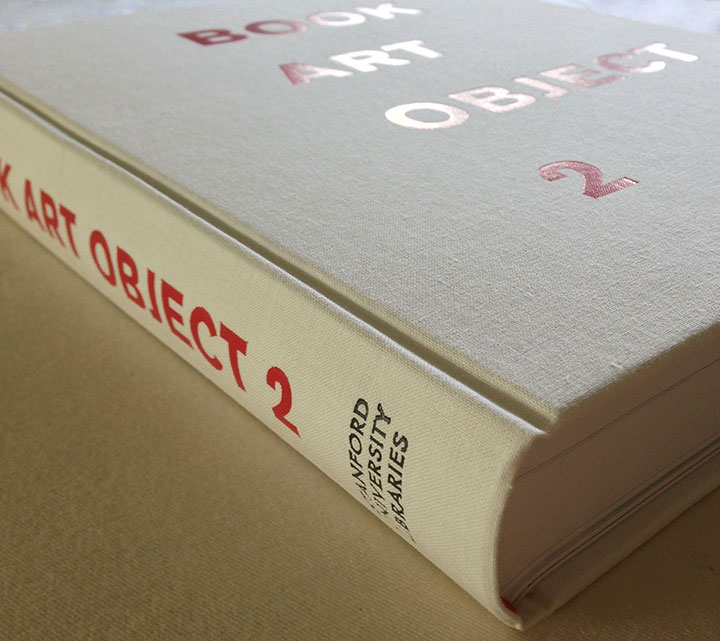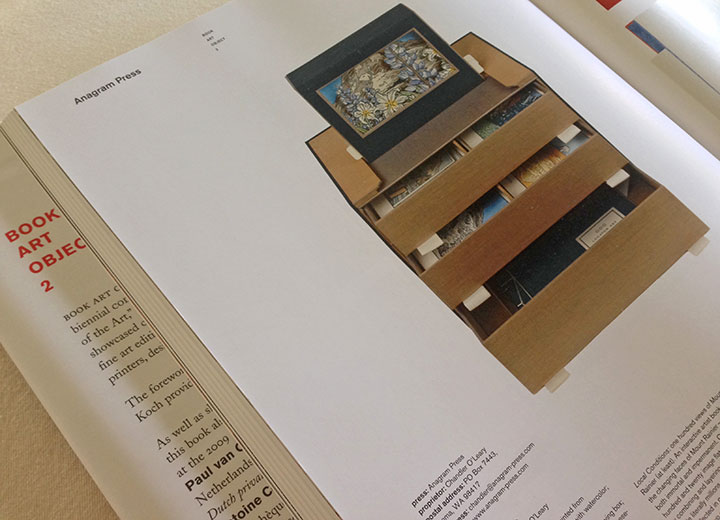February 3rd, 2015
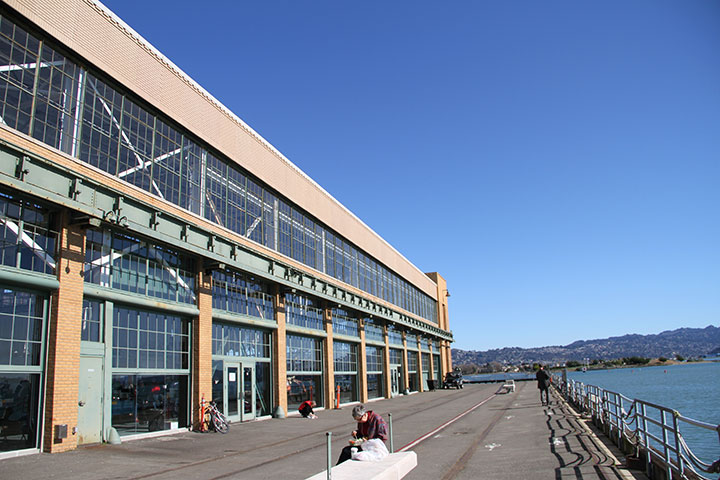
Well, I’m hitting the road again—I can’t believe it’s been two years already, but the CODEX Bookfair has come around again. Jessica and I will both be exhibiting, and we’ll have lots of new projects making their debut there (including the new Dead Feminist broadside!)
The best thing about CODEX is being able to stand in a room with hundreds of pieces of art—art that you can touch, while you have a conversation with the artist who made it. The event showcases the work of some of the best book artists, printmakers, paper artists and typographers working today—the result is an astounding display of artwork and ephemera from all over the world. So if you’re even remotely local, it’s well worth the trip.
You’ll find me at the Anagram Press table (#84)—so stop by and say hello!
Fifth CODEX International Bookfair
February 8-11, 2015
Craneway Pavilion, Richmond, CA
Open today and Tuesday 12:30 to 6; Wednesday 10 to 3
Admission: $10 per day ($5 students) or $30 for multi-day pass
March 18th, 2013
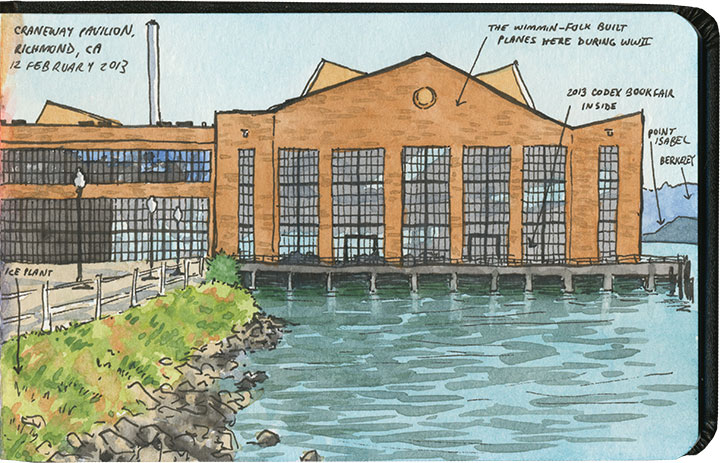
It’s hard to believe it’s been two years since the last one, but a few weeks ago I was back for my second showing at the Codex International Bookfair. The four-day fair was at a new venue this year—a space so gorgeous just I had to break out the ol’ sketchbook.
This year (and hopefully every year from here on out) we were hosted by the Craneway Pavilion in Richmond, CA. Now a part of Rosie the Riveter National Historic Park (bonus points for being part of something else I love), the former Ford plant was used as a major military plant during World War II.
We had completely outgrown the old Codex stomping grounds in Berkeley—so while none of us knew what to expect of the new space, we were just hoping it would be big enough to fit a couple hundred artists under one roof.

We got way more than we bargained for—the space is absolutely cavernous. The bookfair was every bit as overwhelming as last time (just try looking at a few thousand pieces of art in four days!), but the Craneway gave the perfect breathing room to do the artwork justice. With its huge banks of windows and three-story ceiling, it almost felt like I was spending each day outdoors. I hated leaving at the end of each day.

And besides—this was the view from my table. Is there anything better than showing your work on one of the best chunks of real estate in the Bay Area? (Though I have to admit, every morning that one—admittedly awesome—Journey song would pop into my head, just like it always does when I’m in the area.*)
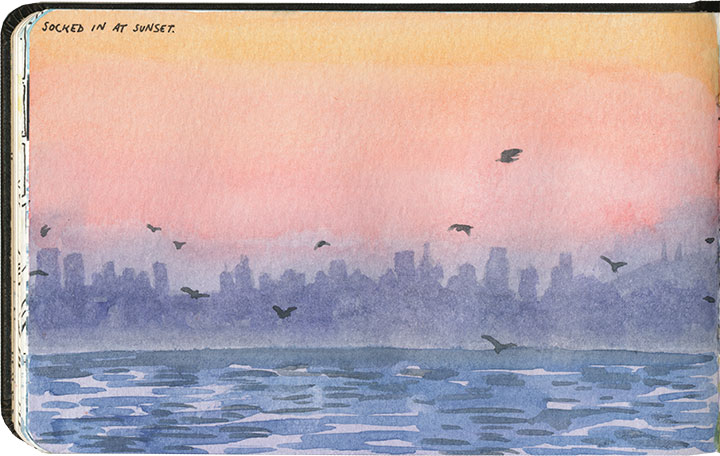
Occasionally I had to remind myself that I wasn’t just there to stare out the window, or bask in the sunshine on the dock outside, or scribble in my sketchbook. But I’m grateful to report that I had a nearly constant stream of visitors to my table to bring me back to reality when I needed it.
Huge props to all the folks who made the commute up to Richmond from San Francisco and Oakland (including Sarah and M-A for their help manning the table!)—judging by the comments I heard all week, you liked the new space as much as I did. And many thanks to all the return visitors from two years ago who came back to say hello (special shout-out to Adam D.!) or leave me with their own goodies. It felt great to be welcomed back.
One last thing: major thanks to Kate Farnady, who created this off-the-cuff stop-motion video of my Local Conditions book, right in the middle of our conversation about it. You made my day.
Codex, I’ll see you in two years—with any luck, right there on the waterfront again.
* Okay, you are not going to believe this, but as I wrote that sentence, that song came up on shuffle in my iTunes! Cross my heart. I’m officially freaked out now…
February 12th, 2013
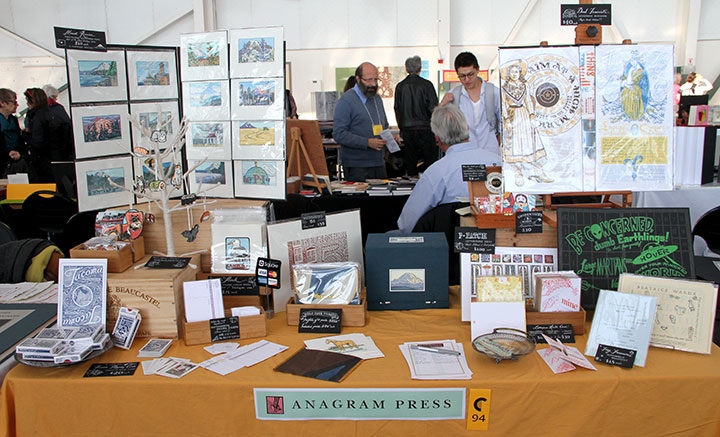
Right now I’m in California, manning my table at the Codex Book Fair. But I have to say, it’s a little hard to concentrate.
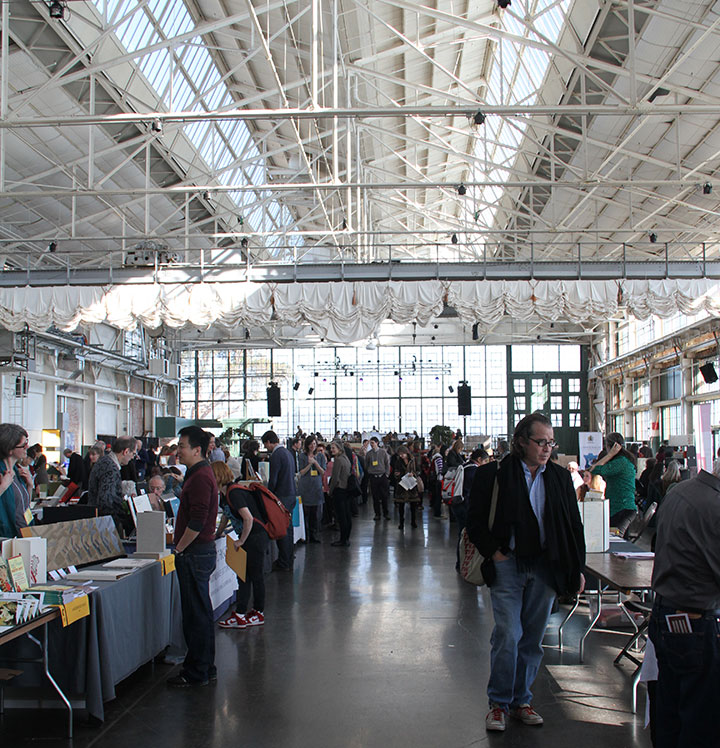
I mean, not only am I surrounded by incredible work by a couple hundred artists—but just look at this space! We’re in a new venue this year, and it is absolutely spectacular.
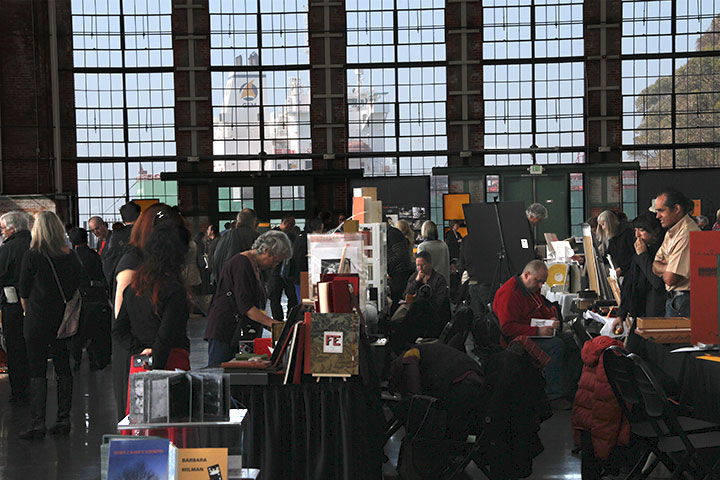
Plus, we’re literally right on the water (really—the pavilion sits right on a pier), so as if all the artwork here weren’t distraction enough, all anyone has to do is just gaze out the window.
Now, it’s a good thing my studio isn’t in a place like this—I don’t think I’d ever get any work done!
March 5th, 2011
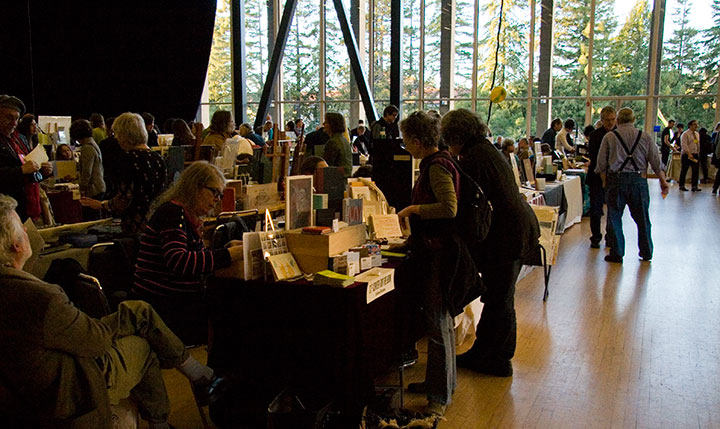
You know, I spent the whole time I was at Codex just trying to process everything around me. I thought the few weeks since that I’ve been telling stories and rehashing memories would make it easier to sort it out in my mind, but I still just can’t seem to articulate the impressions bouncing around the inside of my skull.
It was just too big … too rich … too much.
Which probably explains why I never managed to get any decent photos. I was too busy standing there goggling at the enormity of it all to document the experience properly. It was all I could do just to man my own table and keep track of all the folks who stopped by to talk to me.
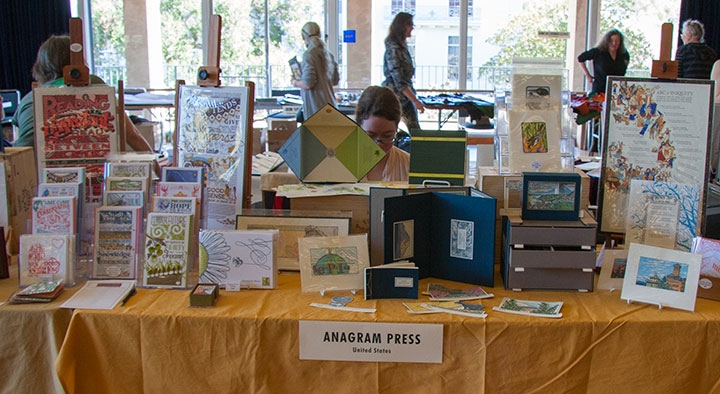
Let me backtrack a bit, and explain what all of this was about. For every discipline, subculture or interest group out there, there’s some sort of club, or society, or conference, or symposium, or bee, or knitting night, or comicon, or hot-dog-eating contest, or what-have-you—some organized gathering for like-minded people to get together and share what they do. If you can think of it, there’s probably a group of people meeting about it somewhere.
The trouble with the book arts is that our world is small and spread out. There aren’t too many of us who do this sort of thing in the first place, at least when compared to photographers, or children’s book writers, or web developers. And then within our little group, everybody follows such a different path that getting us together is like herding cats. We’re hard to pin down because there’s a whole universe in our little speck of dust. Printing, bookbinding, papermaking and typesetting are just the tip of the iceberg. Within each of those disciplines is an incredibly broad spectrum of different and often contradictory artists and art forms. And yet each of those fits comfortably, easily, infinitely under the same, paradoxically small umbrella of the book arts. (Now you know why I’m not great at elevator speeches.) If you tried to graph it out, you’d end up with either the world’s best or worst Venn Diagram—I can’t decide.
So because we run such a crazy gamut, we can’t be shoehorned in neatly with some other event, even though the “average” book artist can and probably does moonlight quite easily as a dozen other things. There’s no “book arts corner” at SXSW, or BlogHer, or the Venice Biennale. Exhibitions and summits dedicated entirely to the book arts are few and far between—large international events are rare, indeed. So for our lot, Codex is a big deal.
This year there were over 140 exhibitors at the book fair, representing artists in every conceivable discipline and style, and every corner of the globe. The exhibitors hailed from 20 states and over a dozen countries outside the U.S., including Russia, Germany, France, Israel, Colombia, Japan, Mexico and Canada.
And it isn’t just for artists: students, educators, private collectors, librarians, museum curators, conservators and archivists, hobbyists, publishers, supply vendors, gallery reps and dealers, bookstore owners, clubs and organizations, and every stripe of enthusiast were in attendance.
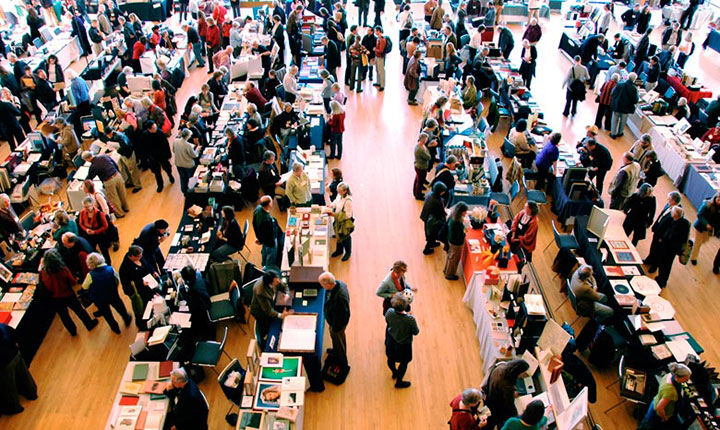
Photo courtesy of the Codex Foundation.
So yeah. Codex is huge.
It was both intimidating and inspiring. I was immediately and constantly confronted with my own insignificance (I kept imagining that at any moment, some cartoon alarm would go off—woop! woop! woop!—alerting everyone to the fact that I didn’t belong there)—yet at the same time, everyone I met was warm and welcoming.
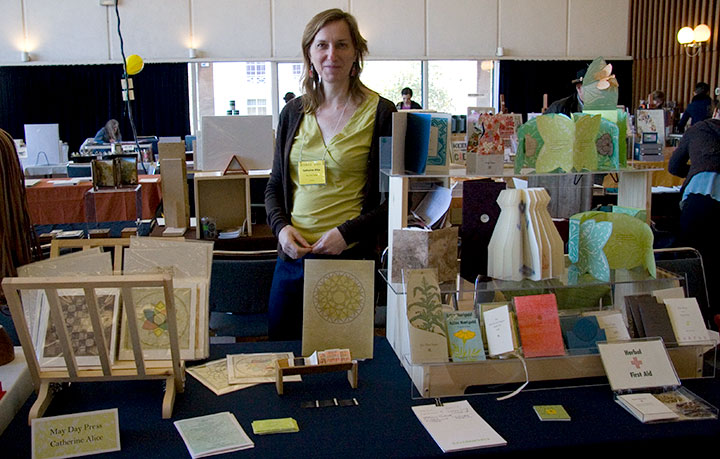
I had the chance to catch up with old friends, meet many of my long-admired art-heroes, and be introduced to a whole host of new faces.
But most of all, Codex was completely, utterly overwhelming. I had my brain cranked up into overdrive for four solid days. After meeting literally hundreds of people, answering thousands of questions, asking another thousand myself, handling many dozens of handmade books and artworks, absorbing new information and taking copious notes, and just being exposed to the ultimate sensory overload of it all—well, by the end, I was a deer in the headlights.
And I feel like I barely scratched the surface of what was there. Imagine that you’re visiting the Louvre, or the Smithsonian, or some other enormous museum. Only instead of picking and choosing which galleries and pieces to see, and making your way through room by room, you discover that every painting, every sculpture, every piece of art in the whole place is crammed into one huge hall—each with the artist who made it standing to the side, waiting to meet you and hear what you think. I’d go mad—I think I did go mad!
Everything I saw was phenomenal—it was hard not to just stand there, slack-jawed, struck dumb by the realization that there I was, in close proximity to some of the best work being done by anyone, anywhere.
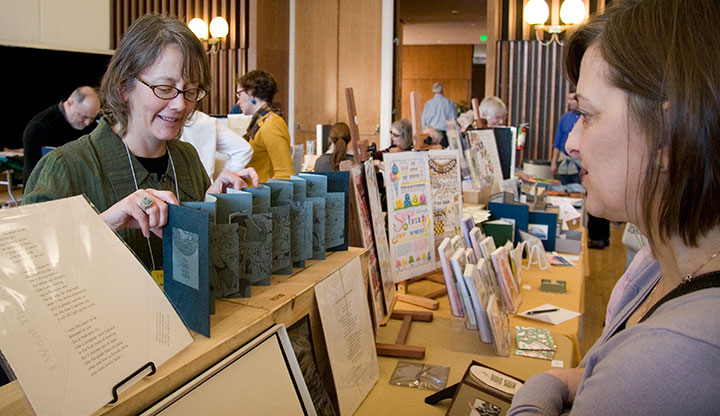
I could go on and on. And I’m sure there were a thousand other great things I never had a chance to see, because I also had a table to man. Jessica and I made the trip together (that’s her showing one of her books), and as we had adjacent tables—
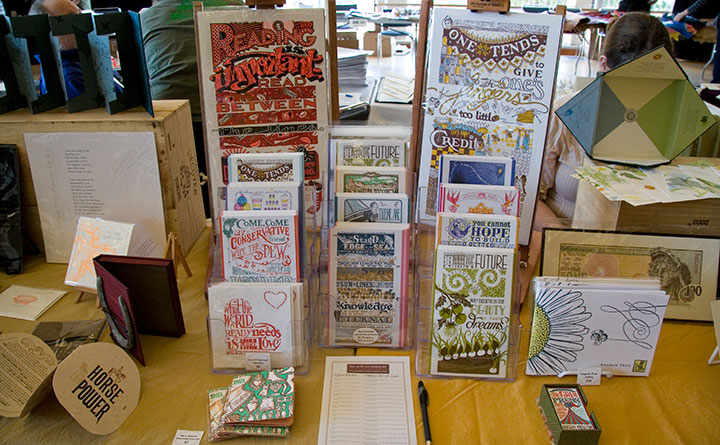
—we met in the middle with our Dead Feminists stuff between us.
Jessica’s done Codex once before, so she was prepared for the overwhelming onslaught of people. She suggested that we put together a letterpress-printed take-away catalog of our work so that after the fair, when everyone was just as dazed as I was, they’d have something to remember us by. (And that ended up being a great idea, and a big hit—we had tons of follow-up messages afterward, and we didn’t see anything like the catalog at the book fair.)
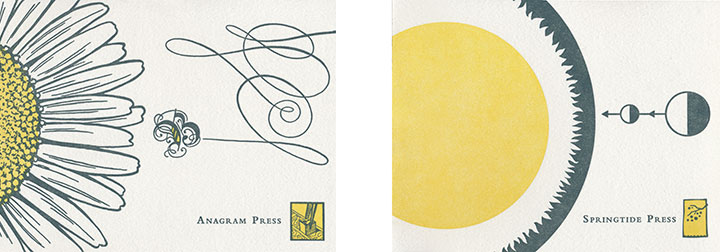
Since we collaborate on so many things, we decided to combine our efforts into one joint catalog—with a twist.
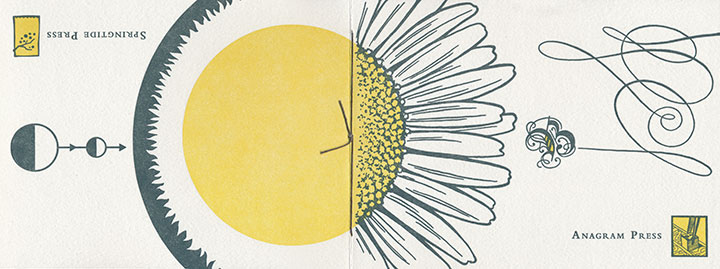
We figured we had an opportunity to clear up a little of the confusion over who does what around here, so we had fun playing with the design possibilities. Jessica came up with a flip-flop format, and I designed two covers that would come together at the spine to form a single image if laid flat.
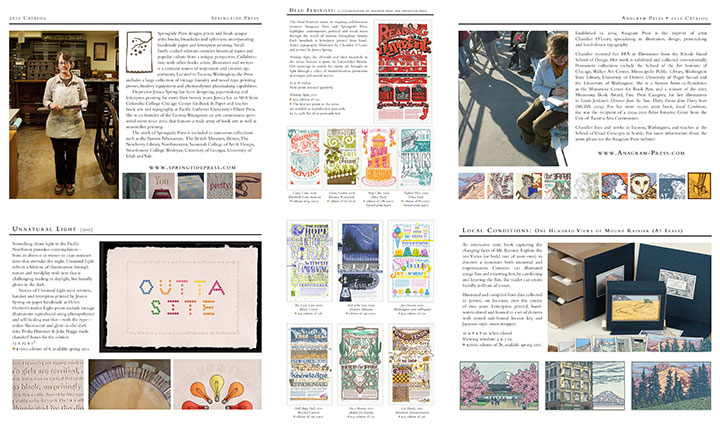
Held one way, you’d read her half of the catalog; flip it over and read from the back, and it becomes my half. We converged in the middle with a Dead Feminist “centerfold” (ha!).
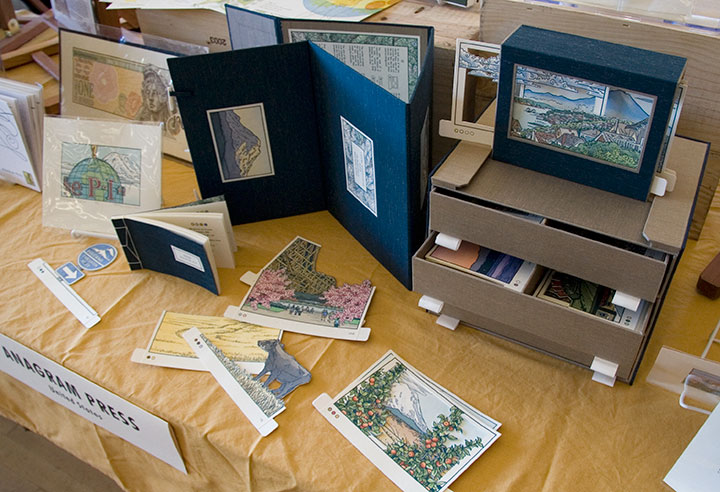
For my part, the most gratifying part of Codex was watching a steady crowd playing with Local Conditions. The response people had to the book was both intensely gratifying and humbling—and it was wonderful to see that students, fellow artists, dealers, curators, professors and collectors were equally excited about it. But my favorite bit was being a bystander to all the different scenes people designed with the image flats.
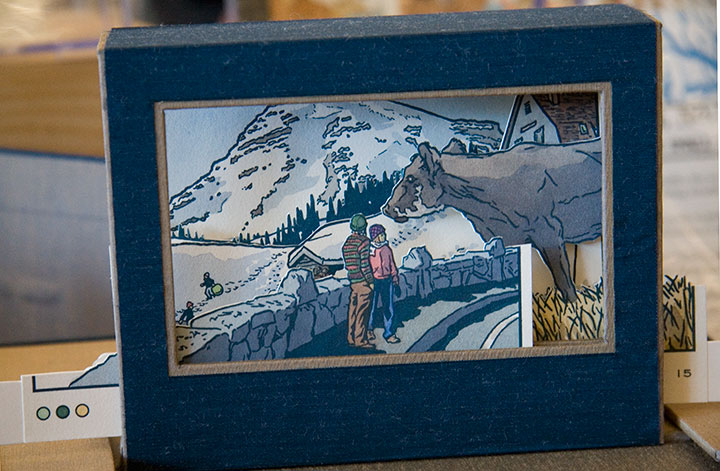
The cow completely stole the show there. It was hilarious to see how many times it turned up in a scene, either a fitting addition I hadn’t thought of—or as an absurdly out-of-place monster.
(Best of all was the cow that stood on the airplane wing and pretended to be a gremlin.)
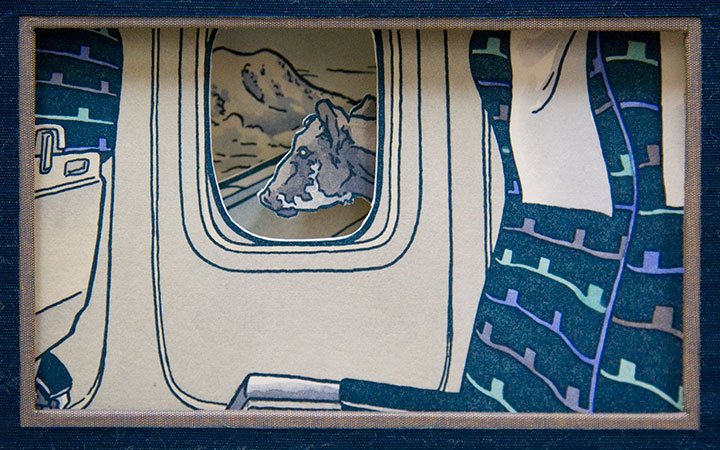
It’s hard to remember that we were in a city as fabulous as Berkeley—the folks at Codex had created a complete world just in that one room. (Though we did get out enough to discover that when the overstimulation had us in a daze, a hot-cookie ice cream sandwich down the street was just the ticket. Thank you, Berkeley!) The next fair is two years away, but I came home with what seemed like a decade’s worth of inspiration. And I find I’m already looking forward to Codex 2013—sensory overload and all.
Bring it on. I’ll be there.
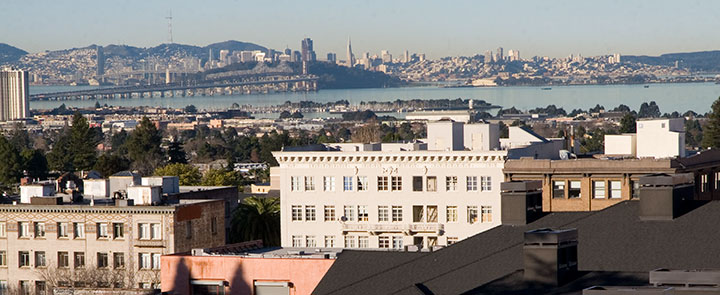
February 11th, 2011

Going A.W.O.L. from the studio can be a very good thing—especially when this is the destination.

I’m here to spend some time with these folks,
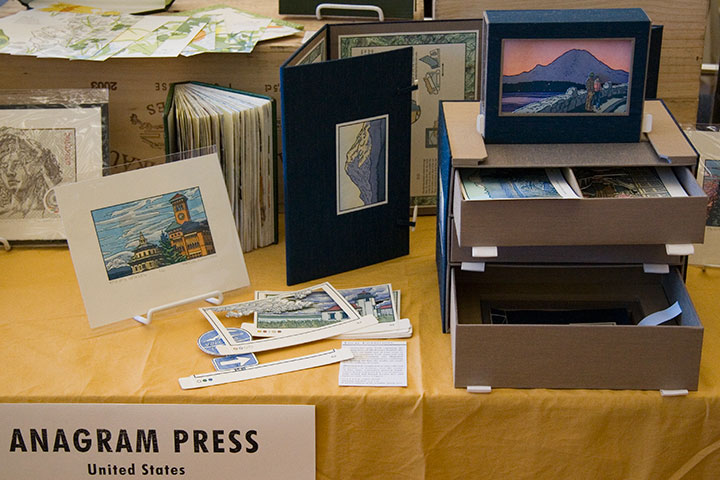
for the sake of this.
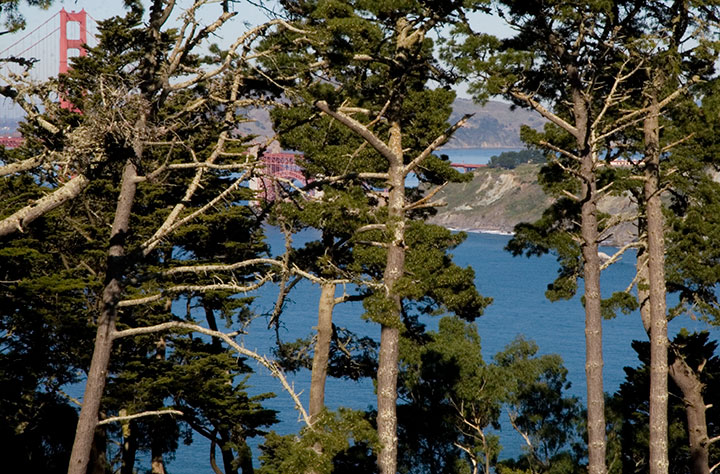
But the “work” part of my trip is done now, so I spent today up here.
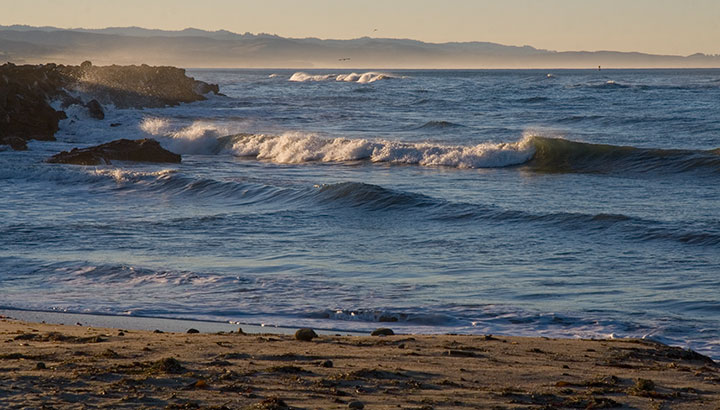
And tomorrow I’m leaving for home, but I’ll be taking the long road, by way of this.
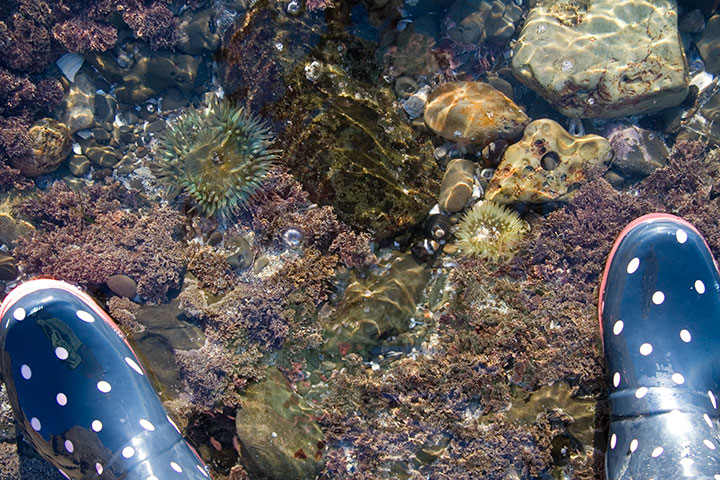
The goal is to take as much time as possible for things like these,
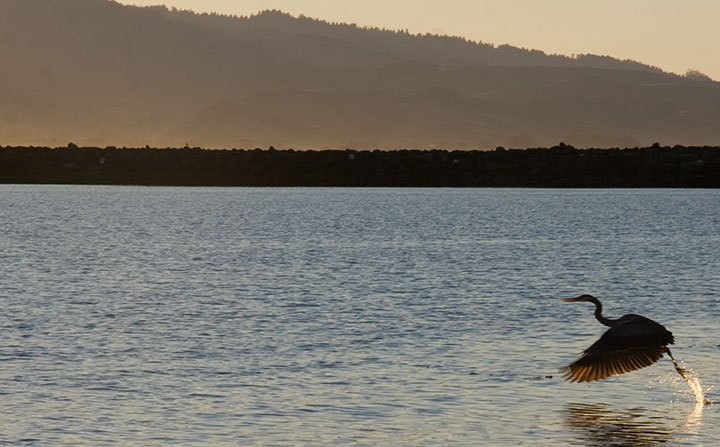
and for moments like this.
I promise to share when I get home and have access to a computer again. See you on the other end of the trail.

![Chandler O'Leary [logo]](https://chandleroleary.com/wp-content/themes/chandleroleary/images/logo.png)
